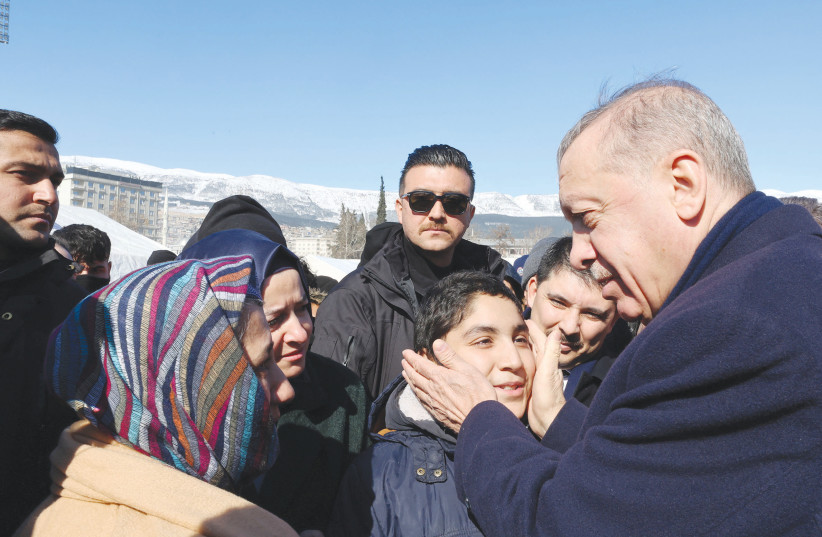Turkey’s coalition of six opposition parties has named Kemal Kılıçdaroğlu, the leader of the largest party in the bloc, as its candidate to compete against President Recep Tayyip Erdogan in elections expected in May. The elections are set to be the toughest challenge Erdogan has faced in his 20 years in office.
For more stories from The Media Line go to themedialine.org
The announcement came after a dramatic weekend for the coalition, which saw the leader of its second largest party walk away on Friday over his nomination, but to then return on Monday after negotiations.
Candidates for the role
The leader of the Good (İyi) Party and a former interior minister, Meral Akşener, had urged the Istanbul Mayor Ekrem İmamoğlu and Ankara Mayor Mansur Mansur Yavaş to put themselves up as the candidate, but a compromise was reached under which the two mayors were tapped as potential vice-presidents.
Both are members of Kılıçdaroğlu’s secular, center-left Republican People’s Party (CHP), and have polled better than him when going head-to-head against Erdogan.
At least some polls have suggested the opposition alliance would beat Erdogan’s Justice and Development Party (AKP) and its coalition partner in the parliamentary vote that will be held on the same day as the presidential election, likely in mid-May.

While some polls show the opposition alliance, and Kılıçdaroğlu, beating Erdogan in head-to-head races, polls held after the catastrophic 7.8-magnitude earthquake that hit the southeast of the country in February suggest that the disaster has not swayed the incumbent’s supporters to the opposition.
Özgür Ünlühisarcıklı, the director of the German Marshall Fund’s Ankara office, told The Media Line that all the opposition party leaders will now be supporting Kılıçdaroğlu because it is in their own interests.
“I think the opposition manifested unity, which was very important,” he said. “Kılıçdaroğlu’s chances of winning the election are at least as [good] as those of Erdogan.”
The weekend’s chaos within the opposition coalition led to around-the-clock coverage in the Turkish media, including from pro-government outlets.
On Monday, thousands gathered outside the building where the party leaders of the coalition came to announce their candidate.
The building was the headquarters of the conservative Islamist Felicity party, symbolizing the ideologically broad spectrum of the coalition.
Former Turkish diplomat Imdat Oner said Kılıçdaroğlu’s experience will give him an understanding of how state institutions work, which Erdogan’s critics believe have been undermined under the Turkish president’s rule.
“I think right now Turkey needs more than anything else… those strong institutions and [a] strong state based on rules and regulations,” said Oner, a senior fellow at Florida International University.
The 74-year-old Kılıçdaroğlu is a seasoned bureaucrat, but many see him as lacking in charisma, unlike İmamoğlu whose win in Istanbul garnered international headlines. İmamoğlu has, however, received criticism for ill-timed social media posts during difficult periods in Turkey.
Kılıçdaroğlu will likely look next at whether the pro-Kurdish Peoples' Democratic Party (HDP) will support him or if it will put up its own candidate.
If HDP refrains from tapping its own nominee, Ünlühisarcıklı says that there is a chance that Kılıçdaroğlu could even prevail in the first round of the presidential race, which requires a candidate to get 50% plus one of the vote.
In 2019, the HDP did not put up its own candidate for mayor of Istanbul, which was seen as tacit support for the CHP, and has been cited as a key reason for its win against Erdogan’s ally in the race.
Over the weekend, when the coalition’s future was uncertain, Kılıçdaroğlu spoke of expanding the bloc and following Monday’s announcement officials have said they want to hold talks with the CHP.
"Our clear expectation is a transition for a strong democracy. If we can agree on fundamental principles, we may support him in presidential elections," said HDP co-leader Mithat Sancar, Reuters reported.
Oner surmised that if the HDP supports the opposition coalition then it will get more than 55% or even 60% of the vote.
He said that such a wide lead against Erdogan and his allies makes it more difficult for any interference in the elections.
He believes Erdogan could try to delay the elections, which the president has suggested would be held on May 14, or even cancel the results.
After İmamoğlu won the Istanbul mayoral election in 2019, the national elections board annulled the results and a rerun took place weeks later, which led to an even larger victory for the CHP’s candidate.
“What Erdogan will do against this coming pressure, a kind of changing dynamics in Turkish politics, I think, is something we need to watch in the two months ahead,” Oner said.
